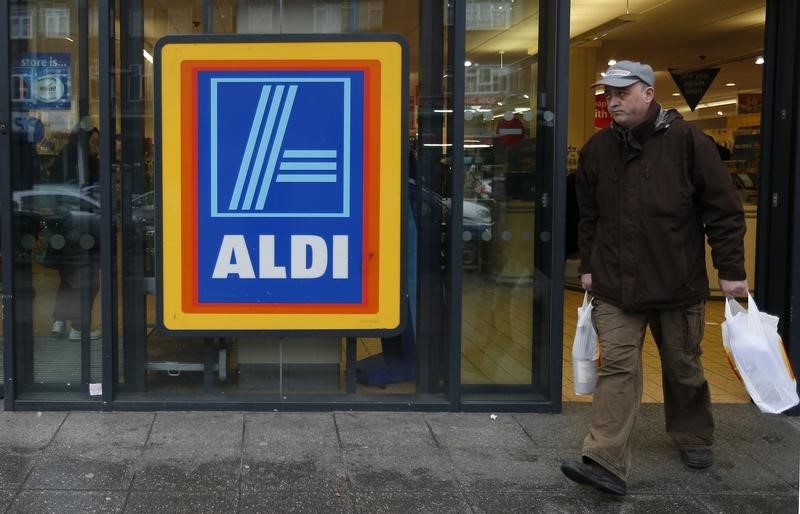By Emma Thomasson and Martinne Geller
BERLIN/LONDON (Reuters) - An expensive fightback by top consumer goods brands is likely to provide only temporary relief as retailers improve the quality of their own products to attract thrifty European shoppers.
Sales from supermarkets' own label ranges have surged in recent years. Cash-strapped shoppers seeking cheaper alternatives to branded favourites have also flocked to discount chains that keep prices low by stocking few top names.
For household goods companies like Nestle (VX:NESN) and Unilever (L:ULVR) (AS:UNc), the advance of private labels has eaten into market share and dented prices and margins.
"Low prices are what matter most. People don't care so much about big names nowadays," said pensioner Lydia Schroeter after buying own brand yoghurt at a Lidl store in central Berlin.
However, own label sales are showing the first signs of slowing down in Europe as established supermarkets slash prices on top brands to try to halt the rapid expansion of discounters like Germany's Aldi [ALDIEI.UL] and Lidl [LIDUK.UL].
For the first time since 2007, own label products lost 0.1 percentage point of market share in 2014 to 38.7 percent, according to research firm IRI, with slowdowns or declines seen in France, Spain, Italy and the Netherlands. IRI assessed data for sales of packaged consumer goods from stores across seven European countries.
"We will continue to see brands forcing the pace in price cutting in future and this will continue to put own label under pressure," said IRI director of strategic insight Tim Eales.
Supermarkets may make more profit with their own labels, but shoppers expect them to stock a broad range of brands and price them competitively.
As stores seek to stand out from discounters, they are increasingly promoting brands. UK supermarket group Tesco (L:TSCO) just cut an average 25 percent off 380 branded items, as it fights to recover from a series of profit warnings and an accounting scandal involving supplier payments.
Unilever, maker of products like Dove soap, expects to win back shoppers as they benefit from lower oil prices and see that brands are not much pricier than own labels.
"Will they really want to go to a hard discounter or will they look to go to a more friendly store?" finance chief Jean-Marc Huet asked in an interview with Reuters.
In France, the market share of own label goods shrank 0.5 percentage points to 29.1 percent in 2014, as retailers like Carrefour (PA:CARR) fight discounters by cutting shelf space for their own goods to promote brands.
"Some good work has been done by big brands," said Antoine Giscard d'Estaing, finance director of France's Casino (PA:CASP), highlighting more attractive prices, new products and heavy television advertising.
SHORT-TERM EFFECT
However, brands' growth can be ephemeral if driven by promotions -- when the deals end and prices rise, private label demand returns.
Rabobank predicts private label will ultimately resume its growth trajectory to account for half of the European market by 2025, driven by discounters, more innovative products and the growth of grocery e-commerce. Consumers are less brand-conscious for the bulky staples they tend to buy online.
"Up until recently, private labels mainly copied big brands, now the best ones are innovating," said Gerald Lindinger-Pesendorfer of German consultants Dr. Wieselhuber & Partner.
"The more professional they are, the more retailers can use own labels to differentiate themselves from their competitors."
Britain's Marks & Spencer (L:MKS) cited innovation in its desserts and party food as the driving factor behind bumper food Christmas sales. M&S scored with creations like a "White Chocolate Snow Bombe" and "Savoury Jelly Shots".
"Ninety percent of our products are incomparable to what other supermarkets have," said Chief Executive Marc Bolland.
M&S Food has focused heavily on categories with least competition from brands, like frozen, chilled and fresh foods. It does less in areas like confectionery, personal care and alcoholic drinks, where brand loyalty is strongest.
"As a student, price is the most important thing to me but I would never buy shampoo or cosmetics from Lidl," said German medical student Emma Hammer.
But even those categories are not totally safe.
Waitrose [JLPLC.UL], a supermarket chain catering for more affluent Britons, sells a "Seriously Intense" line of premium ice cream and chocolate, a rival to Unilever's Ben & Jerry's.

In Germany, consumers rank the Balea beauty range made for the DM chain almost as highly as Beiersdorf's (DE:BEIG) Nivea.